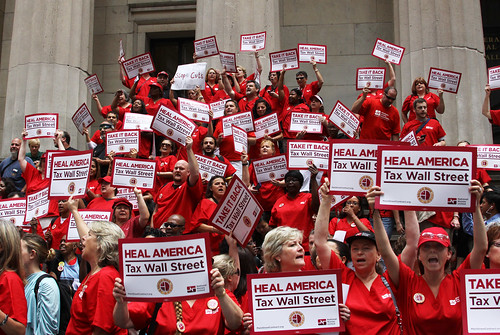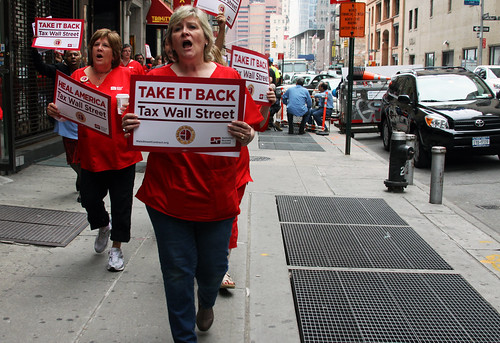More than a thousand RNs and other activists marched on Wall Street Wednesday, chanting “Wall Street got bailed out! We got sold out!”
They stood on the steps of Federal Hall across from the New York Stock Exchange and held signs – “Take it Back! Tax Wall Street” and “Heal America! Tax Wall Street” – so crowds of curious passersby got the message.
It’s time to make Wall Street high rollers who created our economic crisis pay its fair share.
Hundreds of nurses from across the country gathered in the heart of our nation’s financial center on June 22, an International Day of Action, to make that message crystal clear.
“It’s time for their shared sacrifice. They haven’t had any of that. They have been making billions and trillions in profit and they are not giving anything back to our community,” said Deborah Burger, RN and member of the National Nurses United Council of Presidents.
The protest is part of the National Nurses United’s Main Street Contract for the American People’s campaign, which aims to reclaim an economy with good jobs at living wages, healthcare for all, quality education, good housing, protection from hunger, a safe environment, and a secure retirement for everyone.
The mainstream media is ignoring the real stories — the stories of people suffering from budget cuts, homelessness, and lack of healthcare.
Representatives from other community and labor organizations stood with the nurses Wednesday to show their support.
“We are calling for a more fair and just economy,” said Karen Higgins, RN and member National Nurses United Council of Presidents.
That’s why NNU, with the support from dozens of community and labor organizations, such as the AFL-CIO, United Auto Workers, and Transport Workers Union Local 100, are calling for a Wall Street tax on financial transactions.
“It’s very American…Just like working people pay taxes on all of their purchases. These corporate speculators who buy and sell and buy and sell our country should pay a minimum tax on that,” NNU executive director RoseAnn DeMoro explained to the crowd. “A very minimum tax could amount to at least $350 billion every year that can go back to our communities and go back to jobs and go back to healthcare.”
Similar events, called by the European Trade Union Confederation, were taking place in 35 other countries in support of a similar tax there. The nurses led the protest in America.
The hour-long rally ended with songs of solidarity. The nurses and fellow community activists left Wall Street — waving their signs and yelling “This is what democracy looks like!”
Bystanders joined in the chant as the sea of red scrubs moved down the street.



